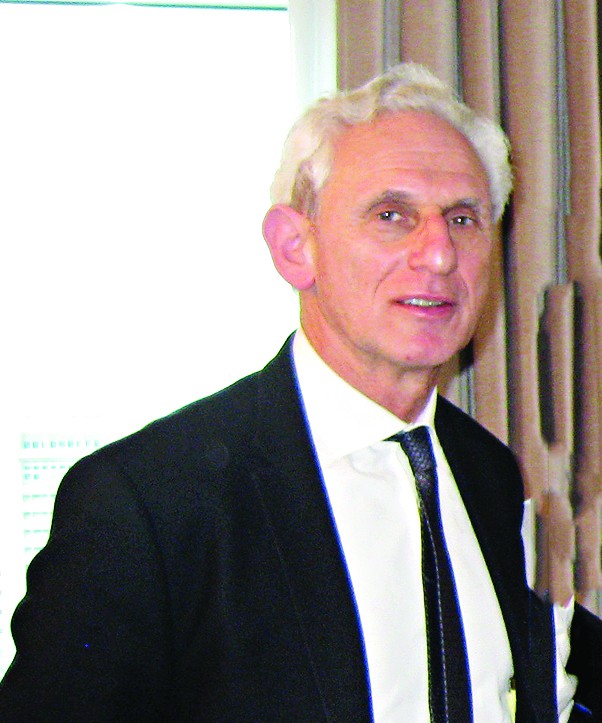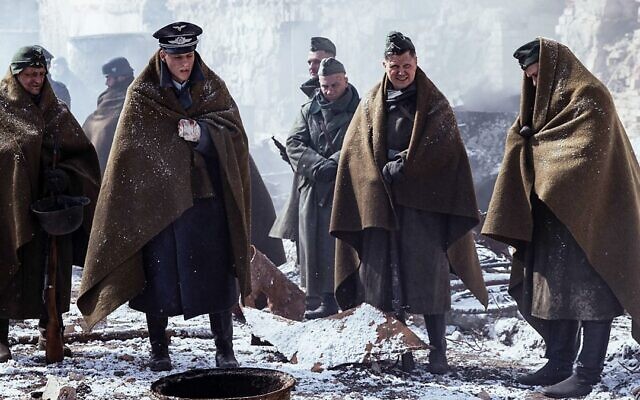OPINION: Journey of remembrance had reached a crucial juncture
Alex Brummer reflects on the power of media in confronting the horrors of the past
Alex Brummer is a Jewish News columnist and the City Editor, Daily Mail
We know so much about the Holocaust but also so little. The recent BBC mini-series Rise of the Nazis fills in gaps. The production, directed by Julian Jones, is unusual in that it uses a mix of actors, brilliant original film footage and slightly stilted commentary from historians.
The series includes insights into life in Hitler’s bunker, terrific footage and analysis of Nuremberg and insights into Nazi murderers and their legal defences. There is extensive material on the search for Nazis who used the ‘Ratline’ to escape to Latin America.
Readers who recently read or dipped into Danny Finkelstein’s Hitler, Stalin Mum & Dad, will find the grainy, silent film of the Westerbork prison camp in Holland, way station to death camps, eerily brought to life by German footage.
The availability of vast amounts of TV, literary and historical material on the Shoah and genocide is relatively recent. The wartime Allies, while anxious to expose the evil of Nazism, also acutely were aware of a narrative they didn’t want to publicise.
Franklin D Roosevelt and Americans minimised Nazi evil for political and strategic reasons. Russian internments of Jews in Siberia was as cruel and heinous as German concentration camps.
The Jews escaping Nazism (including my own father turned back from Haifa in 1939) and the German Jewish refugees interned in the UK were treated as an enemy rather than victims.
The BBC series reminded viewers that until the NBC American TV series The Holocaust was broadcast in 1978, the events of the Shoah remained unexplored in popular Western culture. In Germany it dramatically changed the narrative as it forced new generations to confront the evil perpetrated by their parents and grandparents.
In my own Shoah-affected family the Holocaust remained a largely verboten subject for much of my younger life. My mother, from an established Anglo-Jewish family, sought to protect my refugee father from being confronted with reminders of how his parents and several of his siblings perished.
When as children we visited my father’s sister, who had survived Auschwitz with another sister and niece, there were whispered conversations in the front of the car. My parents were discussing the ‘miracle’ birth of my young cousins whose mother had been through a medical trauma in the camps.

Little did I know that in Ramat Gan in Israel there was a similar experience for my late cousin Zvi. Every Saturday morning my uncle Martin (my father’s youngest brother) would drink coffee with a fellow survivor on the balcony exchanging memories in Hungarian.
Cousin Zvi would listen (he had picked up Hungarian from his parents).
There were horrific memories including an account on being tied all day to a train line after an escape attempt.
There was no direct conversation about the family experience. It was only a generation later when a younger Israeli cousin, armed with a rough chart drawn by my aunt, found his way to the remains of the hut occupied by his mother at Buchenwald and recited a quiet prayer.
In their later years my dear Aunt Rose and cousin Sheindy opened up on their experiences as teenagers. They would regularly talk at local schools in the Brighton area. The Shoah was directly confronted. On the afternoon of just passed Shabbat Shuva, after shul in Hove, I visited my admirable cousin Sheindy, now in her 90s but as sharp as a button. On her dining table was Dan Stone’s book The Holocaust: An Unfinished History.
Scheindy showed me a letter pushed through her door from a neighbourhood 10-year-old. The child’s class were studying World War II and requested a chat with a living witness. She had no hesitation in saying yes.
The Shoah is out of the cupboard. It took decades to do so and it is so important, as survivors fade away, that the world does retreat back to where it was in the immediate decades after the war when Holocaust disclosure was supressed.
Remembrance, in the shape of museums and prominent memorials as in Berlin, but not yet London, are more critical than ever.
- Alex Brummer is a Jewish News columnist and City Editor for the Daily Mail.

Thank you for helping to make Jewish News the leading source of news and opinion for the UK Jewish community. Today we're asking for your invaluable help to continue putting our community first in everything we do.
For as little as £5 a month you can help sustain the vital work we do in celebrating and standing up for Jewish life in Britain.
Jewish News holds our community together and keeps us connected. Like a synagogue, it’s where people turn to feel part of something bigger. It also proudly shows the rest of Britain the vibrancy and rich culture of modern Jewish life.
You can make a quick and easy one-off or monthly contribution of £5, £10, £20 or any other sum you’re comfortable with.
100% of your donation will help us continue celebrating our community, in all its dynamic diversity...
Engaging
Being a community platform means so much more than producing a newspaper and website. One of our proudest roles is media partnering with our invaluable charities to amplify the outstanding work they do to help us all.
Celebrating
There’s no shortage of oys in the world but Jewish News takes every opportunity to celebrate the joys too, through projects like Night of Heroes, 40 Under 40 and other compelling countdowns that make the community kvell with pride.
Pioneering
In the first collaboration between media outlets from different faiths, Jewish News worked with British Muslim TV and Church Times to produce a list of young activists leading the way on interfaith understanding.
Campaigning
Royal Mail issued a stamp honouring Holocaust hero Sir Nicholas Winton after a Jewish News campaign attracted more than 100,000 backers. Jewish Newsalso produces special editions of the paper highlighting pressing issues including mental health and Holocaust remembrance.
Easy access
In an age when news is readily accessible, Jewish News provides high-quality content free online and offline, removing any financial barriers to connecting people.
Voice of our community to wider society
The Jewish News team regularly appears on TV, radio and on the pages of the national press to comment on stories about the Jewish community. Easy access to the paper on the streets of London also means Jewish News provides an invaluable window into the community for the country at large.
We hope you agree all this is worth preserving.






















